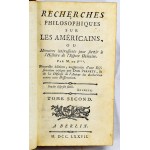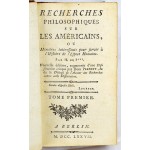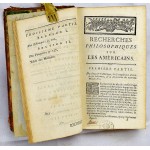Recherches philosophiques sur les Americains ... Par M. de P***. [i.e. Cornelius de Pauw.] Nouvelle edition, augmentee d'une dissertation critique par Dom Pernety, & de la Defense de l'auteur des Recherches contre cette dissertation (2 volumes)
Recherches philosophiques sur les Americains ... Par M. de P***. [i.e. Cornelius de Pauw.] Nouvelle edition, augmentee d'une dissertation critique par Dom Pernety, & de la Defense de l'auteur des Recherches contre cette dissertation (2 volumes)
Cornelius de Pauw; Antoine-Joseph Pernety
Berlin, 1777
2 tomes. Bound in contemporary mottled calf. Gilt stamped spine compartments. Joints cracked. All edges marbled, marbled end sheets. xviij, [2], 276, [26] p.; [4], 304 pp. [32 pp. table]; 116 pp. Originally published separately: Berlin, 1770, George Jacques Decker. Small book plate of Annemarie Schnase. Sabin 59242. Barbier IV, 26. Graesse V, 178.
In this work, De Pauw extends Buffon's theory of new world degeneracy; that Europeans that colonized America would also become degenerate. De Pauw asserts that Americans and even their animals are naturally inferior to the people of Europe and degenerate due impart to geography and climate (as the French seemed to believe that the New World was extremely cold, Quebec, or extremely humid, Louisiana). A controversial early work in scientific racism and European bigotry, read and argued against by Thomas Jefferson (see: "Jefferson's Moose"), Alexander Hamilton, and James Madison. Much of the content of Jefferson's "Notes on Virginia" stresses naturalist, anti-degeneracy arguments against Buffon and De Pauw's arguments. The controversy was significant in that the success of the idea of American degeneracy would have curbs European settlement and investment in America and harmed the development of the nation. An interesting work in that it shows the intellectual birth of French anti-Americanism. See Lee Dugatkin, "Mr. Jefferson and the Giant Moose: Natural History in Early America," U. Chicago, 2009.
First printed in 1769 and 1770.





